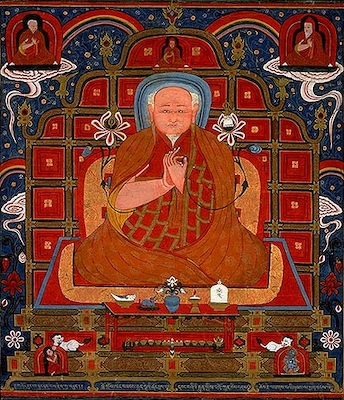Drogon Chogyal Phagpa: Difference between revisions
Kent Sandvik (talk | contribs) (Use frame image tags) |
Bj Lhundrup (talk | contribs) No edit summary |
||
| Line 1: | Line 1: | ||
[[Image:Drogon chogyal phagpa.jpg|right|frame|Drogon Chogyal Phagpa 1235-1280 A.D]] | [[Image:Drogon chogyal phagpa.jpg|right|frame|Drogon Chogyal Phagpa 1235-1280 A.D]] | ||
===Biography=== | |||
[[Drogon Chogyal Phagpa]] (1235-1280 A.D) was the son of Zhangtha, and was the nephew of [[Sakya Pandita Kunga Gyeltsen|Sakya Pandita]]. He gave his first [[Hevajra]] teaching when he was eight. Due to this event he was called the Noble one ([[phags pa]]). He mastered the inner and outer teachings, [[Kalachakra]] and majority of the teachings knowin in Tibet at that time. | [[Drogon Chogyal Phagpa]] (1235-1280 A.D) was the son of Zhangtha, and was the nephew of [[Sakya Pandita Kunga Gyeltsen|Sakya Pandita]]. He gave his first [[Hevajra]] teaching when he was eight. Due to this event he was called the Noble one ([[phags pa]]). He mastered the inner and outer teachings, [[Kalachakra]] and majority of the teachings knowin in Tibet at that time. | ||
Latest revision as of 03:46, 7 December 2010
Biography
Drogon Chogyal Phagpa (1235-1280 A.D) was the son of Zhangtha, and was the nephew of Sakya Pandita. He gave his first Hevajra teaching when he was eight. Due to this event he was called the Noble one (phags pa). He mastered the inner and outer teachings, Kalachakra and majority of the teachings knowin in Tibet at that time.
The great Mongol emperor Sechen invited him to China where he carried out great works. He ordained thousands of monks each year in China, while also giving many teachings. He also compiled the first Mongol alphabet in response to the king who requested the teachings to be translated and recorded.
Drogon Chogyal Phagpa became by decree of the Mongol emperor the first religious and temporal ruler of Tibet.
Drogon Chogyal Phagpa is one of the Five Superiors of the Sakya Tradition.
Literary Works
Main Teachers
Main Students
Main Lineages
Alternate Names
Other Reference Sources
Internal Links
- Add double-brackets "[[ ]]" around any relevant word or phrase and it will create a new page for that term or link to an already existing page
